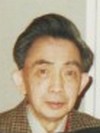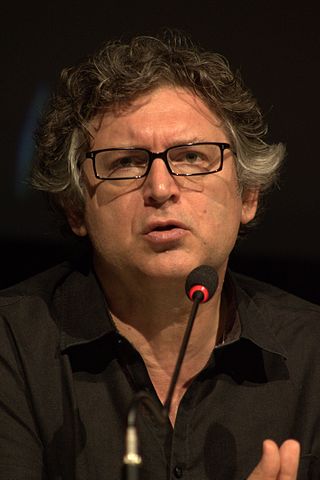
Michel Bulteau is a French poet, essayist, occasional musician and experimental filmmaker, born on 8 October 1949 in Arcueil.

Michel Bulteau is a French poet, essayist, occasional musician and experimental filmmaker, born on 8 October 1949 in Arcueil.
When he was twenty-two, he contributed with seventeen other young poets, including Matthieu Messagier, Jean-Jacques Faussot, Jacques Ferry, Patrick Geoffrois and Thierry Lamarre to a poetry bundle entitled 'Manifeste Électrique aux paupières de jupes' (Electrical Manifesto with Eyelids of Skirts), which was published in 1971 by Le Soleil Noir. The poetry bundle entitled 'Manifeste Électrique aux paupières de jupes' was a literary manifest that caused a stir in the literary world. Encouraged by the Belgian-French poet and writer, Henri Michaux, he continued his quest as a rebellious poet.
In 1976, he moved to New York where he became friends with beat writers, painters and pop punk musicians. Bulteau is, in the words of William S. Burroughs, an "explorer of untouched psychic areas."
Michel Bulteau was only twenty-one years when '7, Retomba des nuits' (1970), his first book of poetry, was published. The poems in this collection are dark, tragic and desperate and are a reflection of the violence and freedom of the Beat Generation as well as the generation of black surrealism. He would publish many more poetry collections which are all characterised by a hypersensibility. This places him firmly in the tradition of great French writers such as Baudelaire, Nerval and Rimbaud. Bulteau has written that "Being modern is the most dangerous artistic route. Being modern means refusing to be untrue, unreal."(Aérer le présent, 1999).
Michel Bulteau has written more than sixty books including poetry books, biographies of famous persons associated with the beat generation and avant-garde art scene (Allen Ginsberg, James Dean, Andy Warhol) as well as journals and essays. He has been an editor of the Nouvelle Revue de Paris in which he published Houellebecq's early poems.
Michel Bulteau is also active as a musician. He was the lead singer of Mahogany Brain, a band with which he aimed to realise his ideal of a marriage between poetry and rock'n roll. The band played pre-punk music that was influenced by drugs (the original cover of their debut showed an arm with a syringe). Their music was a crossing of Velvet Underground's White Light/White Heat and Captain Beefheart's Trout Mask Replica. The band was quite short-lived: they played their only concert in the summer of 1970 at the Lucemarie during which Bulteau threw bricks at the few members of the audience. After that they became a studio band recording two records. In December 1970 Mahogany Brain recorded the album With (Junk-Saucepan) When (Spoon-Trigger) released by the Futura label early the next year and they also provided the soundtrack to a short film of Bulteau's, Main Line. Another record, Smooth Sick Lights, was recorded on a single day in June 1972, but only released several years in 1976 later by the Pole label. Mahogany Brain issued a new record under the title With/Without in 2004 on Mello Records. Michel Bulteau has recorded a maxi 45 with Elliott Murphy (1989) and a further three solo albums during the nineties and in 2004.
Michel Bulteau has directed and contributed to a number of avant-garde movies which place him in the tradition of experimental directors such as Kenneth Anger, Stan Brackage and Jean Cocteau.
Michel Bulteau appears as a character in the novel The Savage Detectives by Chilean author Roberto Bolaño. In the novel Michel Bulteau meets Ulises Lima, one of the main characters of the novel, in Paris circa 1976. Later, a Peruvian poet, Roberto Rosas, becomes obsessed with his poem "Sang de Satin" as he is trying to translate it into Spanish.
Lettrism is a French avant-garde movement, established in Paris in the mid-1940s by Romanian immigrant Isidore Isou. In a body of work totaling hundreds of volumes, Isou and the Lettrists have applied their theories to all areas of art and culture, most notably in poetry, film, painting and political theory. The movement has its theoretical roots in Dada and Surrealism. Isou viewed his fellow countryman Tristan Tzara as the greatest creator and rightful leader of the Dada movement, and dismissed most of the others as plagiarists and falsifiers. Among the Surrealists, André Breton was a significant influence, but Isou was dissatisfied by what he saw as the stagnation and theoretical bankruptcy of the movement as it stood in the 1940s.

Lanza del Vasto was an Italian philosopher, poet, artist, Catholic and nonviolent activist.

François Cheng is a Chinese-born French academician, writer, poet, and calligrapher. He is the author of essays, novels, collections of poetry and books on art written in the French language, and the translator of some of the great French poets into Chinese.

Michel Onfray is a French writer and philosopher with a hedonistic, epicurean and atheist worldview. A highly prolific author on philosophy, he has written over 100 books. His philosophy is mainly influenced by such thinkers as Nietzsche, Epicurus, the Cynic and Cyrenaic schools, as well as French materialism. He has gained notoriety for writing such works as Traité d'athéologie: Physique de la métaphysique, Politique du rebelle: traité de résistance et d'insoumission, Physiologie de Georges Palante, portrait d'un nietzchéen de gauche, La puissance d'exister and La sculpture de soi for which he won the annual Prix Médicis in 1993.

Paul Armand Silvestre was a 19th-century French poet and conteur born in Paris.

Abdellatif Laâbi is a Moroccan poet, journalist, novelist, playwright, translator and political activist.

Sylvain Maréchal was a French essayist, poet, philosopher and political theorist, whose views presaged utopian socialism and communism. His views on a future golden age are occasionally described as utopian anarchism. He was editor of the newspaper Révolutions de Paris.
Michèle Lalonde was a Canadian dramatist, essayist, playwright and poet for print and radio. She began her career as a writer and publisher while studying for a Bachelor of Arts degree at the Université de Montréal. Throughout her career, Lalonde worked at the editorial boards of the magazine Situations, the journal Liberte and Maintenant. She authored historical plays and collections of poems and won the 1980 Prix Duvernay from the Saint-Jean-Baptiste Society. Lalonde was professor of the history of civilizations at the National Theatre School of Canada, served as president of both the Fédération internationale des écrivains de langue française and the Quebec Writers' Union, and was a member of the Order of Francophones of America. Her works from 1957 to 1977 are stored in the Montreal collection of the Bibliothèque et Archives nationales du Québec.

Raphaël Bassan is a French film critic and journalist, who has specialized in experimental film and the history of cinema. He has also made three short movies.

Hélène Dorion, is a Canadian poet, and writer.
Jacques Izoard was a Belgian poet and essayist. He was born Jacques Delmotte at Liège.
Liliane Wouters was a Belgian poet, playwright, translator, anthologist and essayist.

Georges-Emmanuel Clancier was a French poet, novelist, and journalist. He won the Prix Goncourt (poetry), the Grand Prize of the Académie française, and the grand prize of the Société des gens de lettres.

Annie Salager is a French poet.
Pierre Torreilles was a French writer, poet and editor.

Jean-Paul Daoust is a Canadian poet. He won the Governor General's Award for French-language poetry at the 1990 Governor General's Awards for Les Cendres bleues.

Michel Luneau was a French poet, writer, publisher, and art collector from Brittany. Born in Nantes, he authored numerous works that blended poetry and prose, exploring themes of art and culture.

Jean-Christophe Bailly is a French writer, poet and playwright.
Laurence Bougault was a French writer and academic. She was also well known as a long-distance adventurer on horseback.

Matthieu Messagier was a French poet.